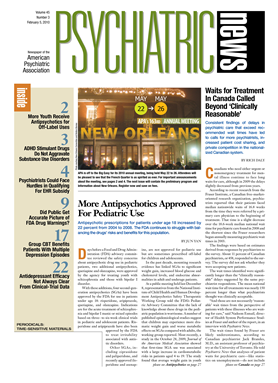Psychiatrists seeking substantial federal funding to help implement electronic medical records in their practices could face a number of new “burdens” under recently proposed regulations implementing the massive federal program.
In December 2009 federal health regulators in the Centers for Medicare and Medicaid Services (CMS) proposed regulations to implement the $19 billion physician and hospital reimbursement program created under the American Recovery and Reinvestment Act of 2009 (PL 111-5). The law provides “incentive payments” of up to $44,000 over five years to physicians who show “meaningful use” of certified electronic health record (EHR) technology (Psychiatric News, March 20, 2009).
The proposed CMS regulations list 25 areas of data that physicians must collect from their patients and record in the EHR systems to show meaningful use of them and thereby qualify for the federal funds.
However, psychiatrists who reviewed the proposed regulations are concerned that they require physicians to collect patient data focused on primary care treatment and not necessarily mental health care, such as charting changes in a range of vital signs.
“If psychiatric software has to collect primary care information, it could add burdens and not value,” said Robert Plovnick, M.D., M.S., director of the APA Department of Quality Improvement and Psychiatric Services, in an interview with Psychiatric News.
Laura Fochtmann, M.D., chair of APA's Committee on Electronic Health Records, told Psychiatric News that the proposed meaningful-use regulations are “rather broad,” and the requirement that clinicians must collect all 25 points of data from all patients may make it difficult for many clinicians and organizations to satisfy the regulations.
“This is particularly true at this stage of the development of commercial electronic record systems, which may technically have the ability to meet these meaningful-use goals but may not be able to do so in a way that is readily usable by clinicians,” Fochtmann said.
Federal regulators will accept public comments on the proposed regulations until the end of February and issue final regulations later in the year. Payments to qualifying physicians will start in 2011.
The proposed regulations did not surprise some EHR experts because they echoed the recommendations that the federal Health Information Technology Policy Committee issued in August 2009. Some members of that group said during a public meeting soon after the proposed regulations were issued that they may recommend reducing some of the quality measures on which physicians are required to report.
Additional regulations to outline specific privacy requirements are expected in other regulations over the next few years. The lack of such patient privacy measures in the proposed regulations was “disappointing but not surprising,” Plovnick said.
APA has urged CMS officials to revise their regulatory timeline and issue the privacy protect ion requirements for EHR systems earlier than the planned 2015 rollout.
The proposed regulations show that federal health officials are moving quickly to implement the physician-reimbursement program; however, “less apparent is whether the currently proposed criteria and incentives will be sufficiently relevant and motivating to actually promote such use,” Fochtmann said.
